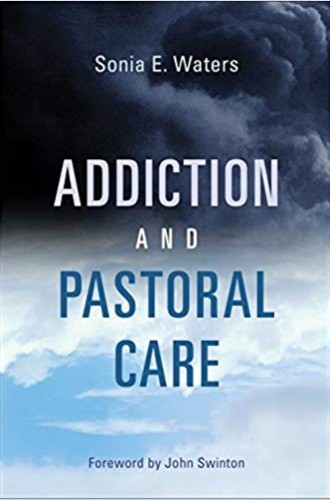Pastoral care that meets addiction at its source
Sonia Waters sees pain and trauma at the heart of this particular type of soul sickness.
While reading this book, I kept hearing the voices of the people I work with daily in detox and addiction treatment. It’s not that Addiction and Pastoral Care offers clear answers to the wrenching theological and spiritual predicaments of people in the midst of addiction. But by treating the problem of addiction with an unusual level of dignity, medical understanding, and theological seriousness, Sonia Waters gives vivid life and meaning to my patients’ spiritual outpourings.
Waters, who teaches pastoral theology at Princeton Theological Seminary, starts by pulling apart the two most popular models for talking about addiction: the moral model, which regards addiction as sin, and the medical model, which regards addiction as disease. She shows how each of these models has reinforced stereotypes, contributed to structural oppression or injustice, and fundamentally failed those with addiction issues—even when intentions were good. The shared failure of these two models, she contends, is “defining the problem through its symptoms” instead of through its source.
Waters identifies the source of addiction as a drive for survival in response to pain and trauma. She believes that addiction occurs when regular people “caught in an effort to survive their inner and outer world” find that effort “decidedly turned against them.”
Pastoral care that misidentifies the real issues at hand cannot offer effective healing, Waters believes. As she puts it, “definition drives care.”
Having often met pastoral caregivers who excuse their lack of education about addiction with an insistence that the guidance of the Holy Spirit is all they need, I applaud Waters’s counterposition: pastoral caregivers must understand the groundings of the spiritual and health issues that affect the people for whom they provide care.
I was cheering by the time I got to Waters’s argument for a “systemically curious” pastoral care—one that acknowledges how legal and social structures, including churches, can contribute to risk factors for addiction and exacerbate the severity or length of addiction issues. Naming systemic racism, homophobia, incarceration, and other forms of systemic evil, Waters makes a strong claim for political activism as a valid pastoral care response to addiction. If Christians are able to stand in awe of “life’s slow, troubled emergence from centers of death,” she notes, “our concern must also extend to what is death dealing in the social world.”
Although she frames addiction in the context of larger social and pastoral issues, Waters uses scripture to analyze how Christian pastoral care might find a way to support people in this complex illness. She skillfully and evocatively uses the story of the Gerasene demoniac to expand a theological view of “soul sickness” that illustrates the larger-than-self spiritual and medical aspects at stake for those struggling with addiction while also claiming the agency of the human person in the midst of it.
Waters is careful not to portray people as purely victims of social circumstances or spiritual forces beyond their control. Her theological framework allows her to emphasize the dignity and hidden wisdom of people with addiction issues. She teases out how their spiritual lives and strengths, especially from the point of view of recovery, can teach and enrich others in powerful ways.
We don’t share the true ugliness of our lives, our personal and moral failures, with other Christians. We seek to be good, to be appropriate, to be worthy of love. But addicts bond through their sins. Whether in rehab, AA/NA meetings, or out on the streets, they tell each other their stories of suffering. I have been changed by their experiences of struggle and grief.
The book’s power resides in its combination of compelling theological language with clear research data on how addictions affect the body. The neurobiological information Waters offers is dense at times, and although she gives examples and uses metaphors to aid comprehension, I found myself yearning for some diagrams to go with her descriptions. Still, the chapters focused on medical aspects of addiction are likely to be a valuable resource for those living with addiction and those who care for them.
The second half of the book focuses on pastoral support in the context of addiction. Waters relies on models for addiction care that are widely used and supported, such as motivational interviewing (a conversational framework that trusts people’s insights into their own lives and encourages healthy change). For pastoral caregivers in parish contexts, this section of the book will be especially useful. In addition to describing models of support, Waters illustrates them with concrete examples and offers tips for using them.
Effective pastoral caregiving adjusts for individual differences, including how seriously a person is able to take their struggle, their motivation for changing and healing, and setbacks they may experience along the way. Waters also names the dynamics of culture, race, gender, and theological background that may improve or sabotage the capacity to offer pastoral support across lines of diversity or difference.
Perhaps most helpfully, Waters discusses at length some common pastoral mistakes: jumping straight to advice, theologizing, and giving answers where none are sought. Although all of these pitfalls are covered in seminary classrooms, they often creep into conversations during times of trauma and hinder the healing power of pastoral work.
Framing pastoral care as a task of curiosity and creativity, Waters invites the pastoral caregiver to imitate Jesus’ own ministry in embodying “creative resistance to the wounds of power on bodies and souls.”






